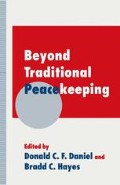Abstract
The end of the Cold War triggered a remarkable surge of optimism about the future of international politics. Concerning Somalia, Haiti, Bosnia and East Central Europe, the same arguments were advanced repeatedly: by taking the lead in collective interventions, nominally under the aegis of the United Nations and/or NATO, the United States can root out the causes of global instability (aggression, nationalism, ethnic turmoil, humanitarian disasters, and ‘failed states’) and thereby create a favourable international climate in which the ‘zone of peace’ based on democracy and free-market economics can be ‘enlarged’. There is, of course, nothing really new in this optimistic view of the future of international politics: this is nothing more than the old wine of classical liberal international relations theory in a new post-Cold War bottle.
Access this chapter
Tax calculation will be finalised at checkout
Purchases are for personal use only
Preview
Unable to display preview. Download preview PDF.
Notes
The immediate post-Second World War antecedents of the strategy of preponderance are comprehensively discussed in Melvyn P. Leffler, National Security, the Truman Administration, and the Cold War (Stanford, California: Stanford University Press, 1992 ). That the United States remains officially wedded to predonderance as the basis of its post-Cold War grand strategy remains clear.
see Christopher Layne, ‘The Unipolar Illusion’, International Security,Vol. 17, No. 4 (Spring 1993), pp. 33–51
Christopher Layne ‘American Grand Strategy after the Cold War: Primacy or Blue Water?’ in Joseph Kruzel (ed.), American Defense Annual (New York: Lexington, 1994).
The post-Cold War version of the strategy of preponderance is defended in Samuel P. Huntington, ‘Why International Primacy Matters’, International Security, Vol. 17, no. 4 (Spring 1993 ), pp. 52–67.
This argument is amplified in Christopher Layne and Benjamin Schwarz, ‘American Hegemony — Without An Enemy,’ Foreign Policy,No. 92 (Fall 1993), pp. 5–23.
President Clinton quoted in R. W. Apple, Jr, ‘Clinton Pushes a Bosnia Plan of Arms Supplies and Bombing’, New York Times, 7 May 1993, p. Al.
Quoted in Alan Tonelson, ‘Superpower Without a Sword’, Foreign Affairs,Vol. 72, no. 3, Summer 1993, p. 167.
James A. Baker III, ‘Confronting Leadership’s Five Myths’, Los Angeles Times,11 July 1993, p. Ml;
Brent Scowcroft, ‘Who Can Harness History?’ Only the U.S.’, New York Times,2 July 1993, p. A15. For other foreign-policy establishment arguments in favour of US leadership
see Joseph S. Nye, Jr, Bound to Lead: The Changing Nature of American Power (New York: Basic Books, 1990) and Huntington (op. cit. in note 2).
Quoted in David Binder, ‘What Comes After Containment? It May Be Son of Containment’, New York Times, 11 July 1993, p. E7.
See Gerald B. Hetman and Steven R. Rather, ‘Saving Failed States’, Foreign Policy, Vol. 89 (Winter 1992–3 ), pp. 3–20.
For an argument that Bosnia will trigger a domino-like sequence of disasters in Europe, see George Kenney, ‘Blueprint for a Wider War,’ New York Times, 30 September 1992, p. A17.
For critiques of the domino theory, see the essays in Robert Jervis and Jack Snyder (eds), Dominoes and Bandwagons: Strategic Beliefs and Great Power Competition in the Eurasian Rimland ( New York: Oxford University Press, 1991 ).
Dick Cheney, ‘The Military We Need in the Future,’ Vital Speeches of the Day,Vol. 59, no. 1, 15 October 1992, p. 13.
Dennis DeConcini, ‘Bomb the Serbs, Now’, New York Times,18 May 1993, p. Al5.
Quoted in Paul Kennedy, The Realities Behind Diplomacy: Background Influences on British External Policy, 1865–1980 ( London: George Allen and Unwin, 1981 ), p. 105.
Ronald Robinson and John Gallagher, with Alice Denney, Africa and the Victorians: The Official Mind of Imperialism (London: Macmillan, 1981 ). See especially Chapter 1.
Correlli Barnett, The Collapse of British Power ( New York: William Morrow, 1972 ), p. 80.
See, for example, Joshua Muravchik, Exporting Democracy: Fulfilling America’s Destiny ( Washington, DC: AEI Press, 1991 )
Larry Diamond, ‘Promoting Democracy’, Foreign Policy,No. 87 (Summer 1992), pp. 25–46.
Lake himself expressly stated that the Clinton Administration does not propose to embark on a ‘democratic crusade’. See his remarks cited in Doyle McManus, ‘Military Downplayed in U.S. Role Overseas’, Los Angeles Times, 22 September 1993, p. A4.
For a realist critique of the proposition that democracies do not fight democracies, see Christopher Layne, ‘Kant or Cant? The Myth of “Democratic Peace”’, International Security (Fall 1994, forthcoming).
Daniel Williams and John M. Goshko, ‘Reduced U.S. World Role Outlined but Soon Altered’, Washington Post,26 May 1993, p. Al.
Editor information
Editors and Affiliations
Copyright information
© 1995 Palgrave Macmillan, a division of Macmillan Publishers Limited
About this chapter
Cite this chapter
Layne, C. (1995). Minding Our Own Business: The Case for American Non-Participation in International Peacekeeping/Peacemaking Operations. In: Daniel, D.C.F., Hayes, B.C. (eds) Beyond Traditional Peacekeeping. Palgrave Macmillan, London. https://doi.org/10.1007/978-1-349-23855-2_5
Download citation
DOI: https://doi.org/10.1007/978-1-349-23855-2_5
Publisher Name: Palgrave Macmillan, London
Print ISBN: 978-1-349-23857-6
Online ISBN: 978-1-349-23855-2
eBook Packages: Palgrave Political & Intern. Studies CollectionPolitical Science and International Studies (R0)

